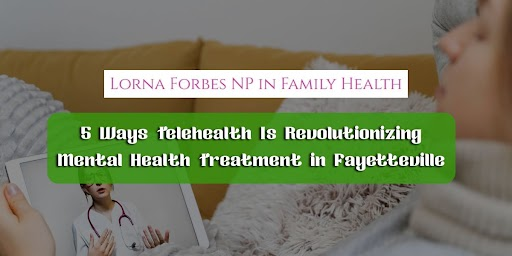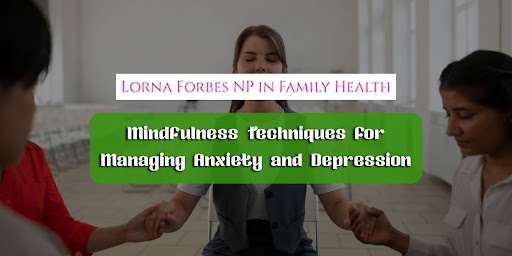5 Ways Telehealth Is Revolutionizing Mental Health Treatment in Fayetteville
When life feels overwhelming, everyday challenges can pile up and feel insurmountable. Whether it’s stress at work, trouble communicating with loved ones, or persistent anxiety, many
people face emotional struggles that seem to have no clear solution. Cognitive Behavioral Therapy (CBT) offers a powerful, evidence-based approach to help individuals identify, understand, and overcome these everyday problems.
At Lorna Forbes NP PLLC, we recognize that mental health isn’t just about managing clinical disorders; it’s also about equipping individuals with tools to navigate the challenges of daily life. Here’s how CBT can help solve 10 common problems you might face — and empower you to live a healthier, more fulfilling life.
Cognitive Behavioural Therapy and How it Helps Solve 10 Everyday Life-Problems.
Cognitive Behavioral Therapy (CBT) is a structured, goal-oriented form of psychotherapy that helps people identify and change unhelpful patterns of thinking and behavior. Grounded in decades of empirical research, CBT teaches practical skills—like cognitive restructuring, behavioral activation, and exposure techniques—to challenge negative thoughts, reduce emotional distress, and build more adaptive responses to daily challenges.
Typically the therapy involves a series of weekly sessions, wherein it encourages active collaboration between therapist and patient, with “homework” exercises designed to reinforce new habits in real-world situations.
Whether you’re dealing with anxiety, depression, stress, or relationship difficulties, CBT offers clear, evidence-based strategies to foster lasting improvements in mood and functioning.
1. Managing Anxiety and Overthinking
Anxiety is a natural emotion, but when it spirals into chronic worry or panic, it can dominate your day. CBT helps individuals recognize the cognitive distortions — like catastrophizing or black-and-white thinking — that fuel anxiety. By challenging irrational fears and developing healthier thought patterns, CBT reduces the intensity of anxious feelings.
How CBT Helps
- Identifying triggers and anxious thoughts
- Practicing mindfulness and
grounding techniques
- Developing rational, balanced thinking strategies
- Learning gradual exposure to feared situations
2. Breaking the Cycle of Procrastination
Procrastination often stems from underlying fears of failure, perfectionism, or feeling overwhelmed. It’s not just about poor time management — it’s an emotional regulation problem. CBT addresses these root causes by helping clients understand the beliefs driving avoidance behaviors.
How CBT Helps
- Recognizing thought patterns that delay action
- Setting realistic, achievable goals
- Learning motivational techniques like
behavioral activation
- Building self-compassion to counteract perfectionism
3. Improving Low Self-Esteem

Many individuals struggle with self-doubt or self-criticism that undermines their happiness and success. Low self-esteem often results from negative core beliefs like “I’m not good enough” or “I’m a failure.” CBT works to restructure these harmful beliefs into more accurate, supportive ones.
How CBT Helps
- Identifying and challenging self-critical thoughts
- Replacing negative beliefs with empowering alternatives
- Building self-affirming behaviors and habits
- Celebrating small successes to reinforce new self-images
4. Reducing Conflict in Relationships

Miscommunications, assumptions, and emotional reactivity can strain even the strongest relationships. CBT offers valuable tools for improving interpersonal skills, managing emotional reactions, and fostering healthy communication. By learning to pause, reflect, and respond thoughtfully, individuals can dramatically improve their relationships with partners, friends, coworkers, and family.
How CBT Helps
- Teaching assertive communication techniques
- Helping clients challenge assumptions and clarify intent
- Reducing emotional reactivity through thought monitoring
- Promoting empathy and active listening skills
5. Overcoming Perfectionism
While striving for excellence can be motivating, perfectionism often becomes paralyzing. Unrealistically high standards and fear of failure can hinder progress and cause chronic dissatisfaction. CBT addresses perfectionism by helping clients reevaluate their expectations and learn to value progress over perfection.
How CBT Helps
- Identifying
all-or-nothing thinking patterns
- Encouraging self-kindness over self-criticism
- Using graded exposure to practice “good enough” efforts
- Learning to separate self-worth from achievements
6. Managing Anger and Irritability
Frequent anger or irritability often masks deeper emotions like fear, sadness, or frustration. CBT teaches individuals how to recognize and address the underlying thoughts that escalate emotional reactions. CBT empowers individuals to respond to provocations thoughtfully rather than reactively, leading to healthier interactions and improved emotional well-being.
How CBT Helps
- Teaching emotional regulation skills
- Recognizing and challenging anger-inducing thoughts
- Developing alternative coping strategies (e.g., time-outs, relaxation techniques)
- Learning problem-solving skills to address stressors
7. Coping with Life Transitions
Major life changes — like moving, changing jobs, or experiencing a loss — can be stressful and disorienting. CBT helps clients process these changes, manage uncertainty, and adapt with resilience.
How CBT Helps
- Identifying and challenging fears about change
- Building problem-solving and coping skills
- Maintaining a balanced perspective on uncertainty
- Strengthening support systems and self-care routines
8. Breaking Negative Thought Cycles (Rumination)
Rumination — the repetitive replaying of negative events or worries — is exhausting and often contributes to anxiety and depression. CBT breaks this cycle by teaching clients to recognize unhelpful thought loops and shift their attention to more constructive activities.
How CBT Helps
- Teaching mindfulness-based strategies to interrupt rumination
- Identifying triggers and implementing thought-stopping techniques
- Encouraging behavioral activation to re-engage with life activities
9. Increasing Motivation for Health Goals
Whether it’s exercising, eating well, or managing a chronic illness, maintaining health habits often requires more than just “willpower.” CBT addresses the psychological barriers that interfere with motivation and consistency. Rather than focusing solely on discipline, CBT builds sustainable motivation through emotional and cognitive change.
How CBT Helps
- Setting clear, achievable health goals
- Addressing all-or-nothing thinking (e.g., “If I miss one workout, I’ve failed”)
- Developing self-reinforcement strategies (celebrating progress)
- Managing emotional triggers for unhealthy behaviors
10. Navigating Social Anxiety
Social anxiety — the fear of being judged, embarrassed, or rejected in social situations — can be deeply limiting. CBT is widely regarded as one of the most effective treatments for social anxiety, helping individuals gradually confront fears and build social confidence.
How CBT Helps
- Challenging catastrophic predictions about social interactions
- Practicing exposure to feared situations in a structured way
- Building assertiveness and conversational skills
- Reducing avoidance behaviors that reinforce fear
Why CBT Works for Everyday Problems
Cognitive Behavioral Therapy is not just for clinical disorders; it’s a practical, flexible approach grounded in decades of research. CBT operates on the idea that thoughts, feelings, and behaviors are interconnected — and that by changing distorted thoughts and adverse behaviors, individuals can improve their emotional well-being and life outcomes.
Key reasons CBT is so effective include:
- Structured and Goal-Oriented: CBT sessions are collaborative and focused on measurable progress.
- Skills-Based: Clients leave therapy with tangible skills they can apply daily.
- Evidence-Based: Numerous studies have demonstrated CBT’s effectiveness across a wide range of emotional challenges.
Empowering: CBT emphasizes client agency, helping individuals become their own therapists over time.
Conquer Everyday Problems with Personalized CBT at Lorna Forbes NP PLLC
Lorna Forbes NP in Family Health offers both telehealth and in-person Cognitive Behavioral Therapy (CBT) that’s tailored to tackle the ten everyday challenges outlined in our blog. We begin with a thorough assessment to pinpoint unhelpful thoughts—whether they fuel anxiety, procrastination, low self-esteem, or rumination—and then co-create a personalized treatment plan. Our evidence-based CBT protocols teach you to identify cognitive distortions, practice structured problem-solving, and build healthier habits.
Through flexible telehealth sessions, we make it easy to fit therapy into busy schedules, while our in-office visits provide a supportive environment for deeper work on relationship conflicts, anger management, and perfectionism. We integrate mindfulness exercises to interrupt negative thought loops and use behavioral activation to boost motivation for health goals. Clients also benefit from our broader suite of cutting-edge offerings—like Spravato® and Transcranial Magnetic Stimulation—when CBT alone isn’t enough, ensuring comprehensive care.
With over 20 years of experience in the healthcare industry, our team of expert therapists brings deep knowledge and compassionate care to every session, ensuring personalized, evidence-based support for your unique needs.With our expert guidance, measurable goals, and ongoing progress reviews, Lorna Forbes NP’s outstanding services empower you to overcome life’s daily stressors and build lasting resilience.
You Don’t Have to Struggle Alone
Everyday challenges don’t have to derail your happiness or potential. Whether you’re wrestling with anxiety, perfectionism, relationship struggles, or motivation issues, Cognitive Behavioral Therapy offers practical tools to reclaim your well-being.
By working with skilled professionals who understand your unique journey, like those at Lorna Forbes NP PLLC, you can build resilience, cultivate healthier thoughts, and embrace the life you deserve — one empowering step at a time.
If you're ready to start making positive changes, reach out today. Your path to a stronger, more confident you is just one conversation away.
Frequently Asked Questions
How can CBT help with everyday problems?
CBT offers tools and techniques that can address common issues like procrastination, stress, anxiety, and social fears. By challenging negative thinking, CBT helps individuals develop healthier coping mechanisms for life's challenges.
Is CBT effective for all types of mental health issues?
While CBT is highly effective for a wide range of mental health issues, including depression, anxiety, and OCD, its applicability varies. It’s best to consult a therapist to see if CBT is the right fit for your specific needs.
How long does CBT take to show results?
CBT is typically a short-term therapy, often lasting between 5 to 20 sessions. However, the time it takes to see results can vary depending on the individual and the issue being addressed.
Can I practice CBT techniques on my own?
Yes! Many CBT techniques, such as journaling, thought-stopping, and relaxation exercises, can be practiced independently. However, working with a therapist can provide deeper insights and more personalized strategies.






